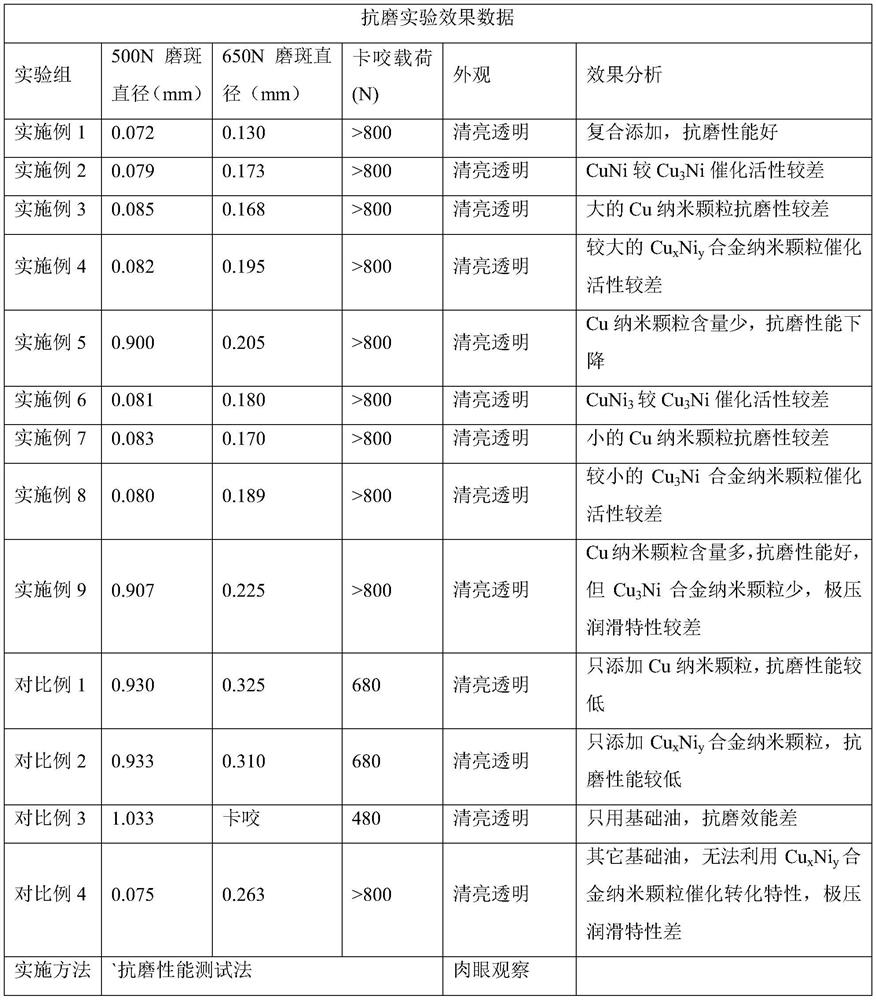Lubricating oil and preparation method thereof
A technology of lubricating oil and oleylamine, applied in the field of lubricating oil, can solve the problems of mechanical structure damage, poor stability of additives, poor extreme pressure lubrication performance, etc., achieve stable performance, improve oxidation resistance, and avoid friction loss.
- Summary
- Abstract
- Description
- Claims
- Application Information
AI Technical Summary
Problems solved by technology
Method used
Image
Examples
Embodiment 1
[0024] This embodiment provides a kind of lubricating oil, and the preparation method includes Cu and Cu 3 The preparation of Ni alloy nanoparticles and the preparation of lubricating oil are specifically prepared by the following methods:
[0025] 1. Cu and Cu 3 Preparation of Ni alloy nanoparticles:
[0026] (1) Preparation of Cu nanoparticles
[0027] Stir and heat 100mL oleylamine liquid to 55°C under inert gas conditions, then add 0.5mmol Cu(NO 3 ) 2 ·6H 2 Add O, keep heating and stirring for 30 minutes, then heat the mixture to 230°C, keep the temperature under stirring for 9 minutes, then stop heating, quickly cool down to room temperature in a cold water bath, collect the product by centrifugation, and finally use ethanol The product was washed three times to obtain oil-soluble Cu nanoparticles coated with oleylamine molecules, with a particle size of about 20 nanometers.
[0028] (2)Cu 3 Preparation of Ni alloy nanoparticles
[0029] Stir and heat 100mL oleyla...
Embodiment 2
[0035] This embodiment is based on the test program described in Example 1, by controlling Cu x Ni y In the preparation process of alloy nanoparticles, the obtained components are different from those described in Example 1, Cu 3 Ni alloy nanoparticles, that is, CuNi alloy nanoparticles, other schemes are the same as in Embodiment 1. Specifically, Cu(NO 3 ) 2 ·6H 2 O and Ni(NO 3 ) 2 ·6H 2 The amount of O added was set at 0.6 mmol.
[0036] The results of the anti-wear test (Table 1) show that the viscosity of the lubricating oil prepared in this embodiment is suitable, and the oil product is clear. Compared with Example 1, because the catalytic properties of CuNi nanoparticles are better than those of Cu 3 Ni is poor, the anti-wear performance of lubricating oil is reduced, the effective lubrication cycle is shortened, and the extreme pressure lubrication performance is reduced.
Embodiment 3
[0038] In this example, on the basis of the test program described in Example 1, by controlling the preparation process of Cu nanoparticles, the Cu nanoparticles with a particle size different from those described in Example 1 were obtained, that is, Cu nanoparticles with a particle size of 30 nanometers. Particle, other schemes are with embodiment 1. Specifically, Cu(NO 3 ) 2 ·6H 2 The amount of O added was adjusted to 0.8 mmol, and the reaction time under heating conditions was adjusted to 8 minutes.
[0039] The results of the anti-wear test (Table 1) show that the lubricating oil prepared in this example has an appropriate viscosity, clear oil, and extreme pressure lubrication performance. Compared with Example 1, the lubricating oil has a lower anti-wear performance, but the overall performance is excellent. In comparative example 2 gained product.
PUM
| Property | Measurement | Unit |
|---|---|---|
| particle diameter | aaaaa | aaaaa |
| particle diameter | aaaaa | aaaaa |
| particle diameter | aaaaa | aaaaa |
Abstract
Description
Claims
Application Information
 Login to View More
Login to View More - R&D
- Intellectual Property
- Life Sciences
- Materials
- Tech Scout
- Unparalleled Data Quality
- Higher Quality Content
- 60% Fewer Hallucinations
Browse by: Latest US Patents, China's latest patents, Technical Efficacy Thesaurus, Application Domain, Technology Topic, Popular Technical Reports.
© 2025 PatSnap. All rights reserved.Legal|Privacy policy|Modern Slavery Act Transparency Statement|Sitemap|About US| Contact US: help@patsnap.com

